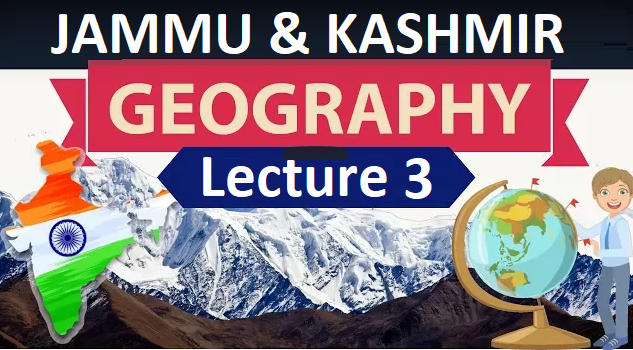Table of Contents
Kashmir valley (Drainage)
1.The main drainage artery of kashmir : Jhelum.
2.Source : Spring of verinag (south kashmir).
3.Jhelum is locally known as Vyeth.
4.Sanskrit : Vitasta.
5.Ancient Greeks : Hidaspes .
6.Ptolemy : Bidaspes
7.Al-Beruni in Kitab Ul Hind : Jhelum
8 . Persian : Behat.
9 . When is leaves kashmir at Baramulla :Koshur Darya.
The tributaries of Jehlum can be grouped into : Himalayan tribuatries and the pirpanjal Tributaries
Himalayan Tributaries
1.Sandren .
2.Bringi .
3.Arpath .
4.Lidder .
5.Arpal .
6.Sindh .
7.Erin.
8.Madhumati
Sandren
- It has its source in the tarn of Sarbal , below the kaukut Peak .
- It is a perennial stream .
- Sothern most of the Himalayan Tributaries.
The Brengi
- The Brengi receives waters of Ahlan , Razaparyun , and Nowbugh at village vailu to swell as Brengi .
Arpath (Kol)
- It rises from the Panchaltan and drains the Kuthar area.
- The Arpath joins Brengi at Mir Danter and the combined stream unites with the sandren at Hainz Danter near khanabal .
The lidder
- Formed by the confluence of two streams , East Lidder(Sheshnag) and West Lidder(Kolohoi glacier).
- It enters Anantnag tehsil at seer kanelgund , and joins Veth at village Gur.
Arpal (kol)
- Passes through the Arpal Village of Tral.
- Meets Jhelum at Chraligund Village Awantipora.
The Harwan
- Also known as Marsar Nallah.
- The stream drains the famous dachhigam national Park .
- Two off shoot stream separate from each other at the mouth of dachigam valley.
- One empties itself in the Harwan reservior.
- Other merges into the Dal Lake near telbal village.
- The Marsar Stream leaves the Dal and assumes the name of “Tsunt-kol” (apple cannal) , and joins jehlum at Gowkadal.
The Sindh
- Rises near the Amarnath cave.
- Merges with Jehlum at Shadipora , Srinagar.
The Erin
- Source : Tarn of Sarbal .
- Enters Wular lake at Nadihal.
The madhumati
• Rises from the high altitude lakes (The Shalinisar and the Lolgulsar) , on the North –
Western slopes of the Harmukh.
• Debouches into Wular , near bandipore.
The Pohru
• The streams of lolab and kahmil join together
at kupwara to give rise to pohru stream.
• Major tribuatry of veth in outfall channel.
• North western tributary of Jhelum
The Pirpanjal Tributaries
The Vishau :
Rises from the Kousernag .
It forms the waterfall of Aharbal.
Feeds irrigation many canals in kulgam .
The Rembiar
• The widest tributary of Jhelum.
• Kalhana named it Ramayana Tawi.
• Rises in the snowfields of Pir Panjal range.
• Joins Visahav at Nyaiyun village .
• The combined deep stream (ancient
ghambira) joined veth as Sangam.
The Romshi
• Rises from the peak of Romshi Thong.
• Joins Veth at kakapore.
Dhoodh ganga
• Rises in the snow field of central pir panjal range near Tata Kuti .
• Enters Srinagar at Rawalpora .
• Joined veth at Chattabal.
The Ferozepore
• Between the peaks of Shin Mahinyuv and Nilakant ki gali , the piranjal is drained by this
stream.
• Part of the water or Ferozpore and sukhnag enters the wetlands of Hokarsar and Mirgund.
• The combined stream empties into wular.
The Ningle
• Originates from western slope of Apharwat ridge.
• Joins Veth near near Village ningle.
Lakes :

• The Dal Lake :
• Right bank of Veth.
• Located in the Eastern part of Kashmir.
• Boulevard was built by last Dogra Ruler Hari Singh.
• Hazratbal basin , The Bod Dal Basin , The Lakut Dal Basin.

The Anchar Lake :
• Near Soura ,in Srinagar.
• Sindh debouches into it.
• Wicker Willow grows on it mud flats.
• The Wular Lake(Bandipora)
• Largest fresh water lake of India.
• Zaina Lank Island, lies close to the eastern silted shore.
• It was built by King Zain-Ul- Abideen in 14th Century.
• Ancient Name : Mahapadmasaras.
• Present name, derrived from its another Sansrit name : Ullolasaras.(lake with high waves)

Characteristic product of the lake is Singhara or the trapa.
• Large willow plantations on its mudflat.
• Mansbal Lake (Ganderbal).
• Deepest Lake on the Valley floor.
TransHimalayan Ladakh

- The word ladakh is derrived from a Tibetian Term “La-tags”(a country from passes).
- Bounded by two mighty mountain systems : Greater Himalayas (South) and Karakoram (North).
- One of the highest inhabited regions in the world.
- Indus furrow is walled in the south by the Zanskar range and North by the Ladakh range.
Valleys in this region :
- Dras : Himalayan Valley.
- Suru : b/w Great Himalaya and Zanskar Range.
- Zanskar Valley : confined to Zanskar Range.
- Shyok-Nubra Valley : North of Ladakh ranges.
- Indus enters India at Demchok , Ladakh.
- The Indus Furrow can be divided into three parts :
a)South Eastern section.
b)Middle Section.
c)North Western Section.
South Eastern
- Demchok to Upshi.
- Rupshu Plateau along its eastern edge.
- Changpa tribe is found here.
- Kyang (wild ass) , Tibetian Hare , Marmots.
- Upshi to Khaltse.
- Leh.
- Called as Central Ladakh.
- Yak , dzo (cross b/w yak and cow).
- Cross breed jersey cows and Merino sheep.
- Russian Merino sheep farms at Matho, Upshi and Loma.
- Angora goat farm at Stakna.
- The common fodder is ole, alfa alfa or Lucerne.
North western Section
- Dards(Indo Aryan people , who migrated from gilgit).
- This small group with indo-Aryan features are called Drogpas or Brogpas (Brog – Yul).
- They abhor cow and it milk.
Download Free PDF – Geography Jammu And kashmir
























 WhatsApp
WhatsApp